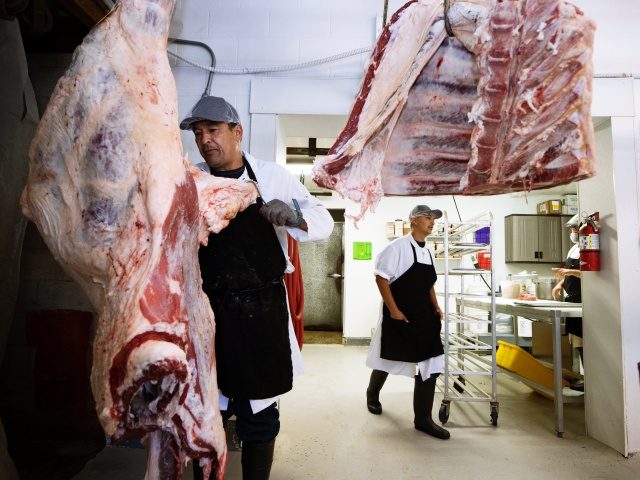President Joe Biden is offering federal aid in the form of a $1 billion package to ranchers, farmers, and independent processors even as he reserves the largest protections for the four meatpacking corporations that dominate the market.
During a roundtable meeting on Monday, Biden announced that his administration will spend about a billion from the $1.9 trillion American Rescue Plan, offering grants to aid independent processors, reviewing anti-competitive practices in the meat industry, and boosting meatpacking capacity.
While Biden noted that “four big corporations control more than half the markets in beef, pork, and poultry,” the administration is seemingly doing little to beat back the consolidated corporate power that Tyson Foods, Cargill, the National Beef Packing Company, and JBS have over the meatpacking industry.
The four meatpacking conglomerates once owned 35 percent of the market. Today, their share of the market stands at 85 percent as presidential administrations and Congress have been unwilling to step in with antitrust maneuvers, once readily used to break up corporate monopolies.
Biden, in October 2021, delivered a boon to the meatpacking corporations when his Department of Homeland Security (DHS) announced they would be ending workplace enforcement of federal immigration law.
Immigration and Customs Enforcement (ICE) raids at meatpacking plants would readily result in arrests and sometimes prosecutions of businesses, managers, and executives for knowingly hiring illegal aliens at the plants.
The elimination of ICE raids is a massive labor protection for the corporate meatpackers just as the administration has released more than half a million border crossers, many of whom will take jobs at meatpacking plants, in the last 12 months.
Biden’s labor giveaway to the corporate meatpackers is the opposite approach taken by former President Donald Trump who titled the labor market in favor of workers and forced meatpackers to invest in robots rather than cheap, foreign labor.
Claire Kelloway with the Open Markets Institute has previously laid out how the Biden administration could take on the consolidated corporate power of the four largest meatpackers:
It can start by issuing stronger rules under the Packers and Stockyards Act — a 1921 law that is supposed to protect farmers against unfair and deceptive business practices. Biden’s USDA could pass rules that actually give contract farmers the opportunity to seek justice when jerked around by meatpackers, and cut loopholes for corporations that justify farmer mistreatment as a “reasonable business decision.” [Emphasis added]
To deter gouging consumers, antitrust enforcers could bring more criminal charges against executives when they conspire to inflate prices, rather than slap-on-the-wrist fines. The DOJ and FTC can also direct federal antitrust enforcers to study and break up the most harmful agribusiness mergers, and block any future mergers that would give a corporation an anti-competitive share of the market. (At a minimum, scholars believe markets are excessively concentrated when four firms dominate 40 percent of all sales, but caps could be set even lower). [Emphasis added]
But effective antitrust enforcement needs to go beyond breaking up Big Meat or cracking down on price fixing. Regulators also need to set new rules of fair play to ensure alternative meatpacking models have a chance to succeed. The FTC has extensive power to issue fair competition rules that would do far more to dismantle corporate dominance, in meatpacking and beyond, than breaking up Big Meat alone. [Emphasis added]
As Breitbart News reported last month, a number of American cattle ranchers have said they are being pushed out of the industry entirely as the corporate meatpackers control pricing and are squeezing family farms to the brink of bankruptcy.
John Binder is a reporter for Breitbart News. Email him at jbinder@breitbart.com. Follow him on Twitter here.

COMMENTS
Please let us know if you're having issues with commenting.